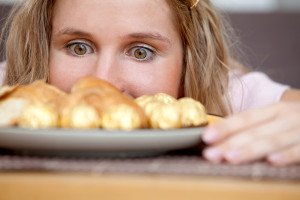Many people suffer from quite severe food cravings that they feel unable to control, sending them into a spiral of self-recrimination and guilt. Often the craving is for carbohydrates in any form, whether it be a bread, sugar, potato chips or alcohol addiction; or it may be for chocolate or other types of dairy products.
There are any number of reasons why people crave certain foods, or have addictions to them, but alongside the psychological reasons for craving “comfort foods”, there are a couple of common physical reasons why.
Frequently when someone complains of cravings or food addictions, I find that there are signs that they have a very low production of stomach acid. Upon questioning they will reel off a list of digestive complaints such as bloating, gas, reflux, indigestion etc. What is happening here is a classic example of the person not absorbing nutrients out of their food due to a digestive problem (You can read another blog post on this subject that goes into more detail here). The cravings are the body’s way of encouraging greater food intake to try to obtain the missing nutrients. When we correct the digestion and the deficiencies, the cravings also reduce.
Another common reason for food cravings, and especially addictions to carbohydrates, is adrenal fatigue. The body is searching for energy in any way it can get it, and the carbs help to produce a short burst of energy, that unfortunately doesn’t last. This sets up a vicious cycle of unstable blood sugar levels that boost you up, then crash you back down, leaving you feeling even worse each time. The answer isn’t in a short term sugar rush, but in supporting adrenal function, balancing blood sugar levels and managing stress so that you can easily make it through the day without fatigue.
Allergies can also cause what is termed “allergy addictions” whereby you actually crave the food that you are allergic to. I find this most often in gluten intolerances, where the person eats wheat based bread at every meal, and feels quite ill without it. It only takes a few days to break this cycle, and once the substance is out of the system, the cravings are no longer there.
We often see our body as “the enemy”, something we have to fight with to remain healthy. But if we remember that our symptoms are just a pointer to the real underlying cause, we can investigate and correct the cause, not just the symptom.
In food cravings and addictions I don’t think I have ever found the cause to be a lack of willpower. That’s just not it. Cravings are just a sign that there is an imbalance that we need to discover and address.
Real healing is about understanding the language of our body and the meaning of it’s words – when we can do that, we will be able to truly heal in a way that is gentle, easy and nurturing.
Leisa
![]()

1 commentAdd comment
I really crave sweet things after lunch and dinner. I can’t go to sleep sometimes without having a sweet hit. I think I really need to investigate some of the reasons you mentioned.
It’s good to know it’s not just because I have no self-control.
I appreciate you sharing this.
Best, Jody.